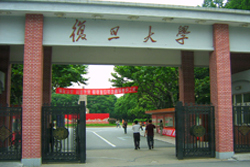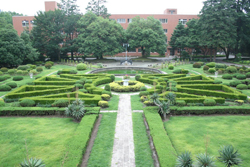What is the Secret of Their Success?
- China’s and Japan’s Universities -
By Park Sa-ra, Head Student Editor
Lee Han-na, Student Editor
The CNU Press Center’s Overseas Cover Teams visited foreign universities to inspect their globalization activities during last summer vacation. One is Fudan University that is one of the first education institutions that enrolled foreign students and its population of foreign student ranks second in China. The other is Utsunomiya University is the first national university that established a faculty for international studies in Japan. Chonnam Tribune reports the findings of this overseas coverage in this article. – Ed.
As universities all over the world try to pursue global standards and to bolster their students’ international competitiveness, CNU set a goal to become one of the Top 100 universities in the world in 2007 and has currently made an effort to become a global university. Chonnam Tribune examines these universities’ activities of international student management and internationalized education programs. To study and implement programs such as these would make CNU become a better globalized university and to have more competitive power as a global university in the world.
Fudan University’s Foreign Student Policy

The FOCT intended to cover FU’s international student management system because it has also achieved worldwide fame. The members of the team went to the Foreign Students Office (FSO) that was established so as to efficiently manage the increasing number of foreign students with 15 professional supervisors and professors in 1987. The office has four departments that are responsible for the enrollment and management of the entire international student population studying at FU such as extension of residence permission, re-entry visas and off-campus accommodation.
Foreign students studying at FU received equal treatment to Chinese students. Zhao Quian-yu, Supervisor of the Admissions Department said, “Foreign students could win a scholarship if their grades satisfy scholarship funding standards and also follow school rules.” Even if there are no foreign and Chinese students’ meetings organized by the FSO in spite of a lot of foreign students studying in the university, the FSO tries to arrange their meetings whenever they want to meet each other and foreign students can organize their own meetings with the active support of the FSO. Through activities like regular meeting with the councils, FU has easily shared foreign students’ opinions on its services and facilities and has made an effort to manage foreign students systematically in order to create advanced systems for them to feel satisfaction when they study at the university.
FU also has the International Culture Exchange School (ICES) to help foreign students understand Chinese culture and live their university lives both on and off campus by teaching them Chinese language and culture. At the same time, FU has established English-friendly circumstances around campus. There are many signboards written in English, and there are many English lectures for foreign students. As an example, in the MBA program, all lectures are conducted in English. We can see that the globalization of FU is going well in various fields and has become a global competitive university.
Utsunomiya University’s International NGO Activities

Shigeru Kitajima, Head of the FIS, said, “We are confronted with diverse challenges and conflicts such as environmental destruction, intercultural conflict and ethnic strife in contemporary international societies. As exchanges among other countries having different cultures and life styles increase, it is required to competent persons to be able to work these urgent and complicated issues. UU provides provide professional education that focuses on international affairs and multicultural public sphere by establishing the Faculty of International Studies, which has comprehensive and interdisciplinary courses to foster international professions.”
The DISS offers courses which provide knowledge about modern society, nation states, regions, and their problems that arise there, so that students may understand the nature of various problems in modern international societies. The DICS offers courses which provide knowledge about various aspects of culture and about exchange between different cultures, so that students may contribute to the promotion of mutual understanding in modern societies. Especially, the DISS have operated several practicums related to international cooperation as regular courses, and many students have participated in various activities of Non-Governmental Organization (NGO) & Non-Profit Organization (NPO) to solve other countries’ social problems.
The SOCT interviewed Japanese students of to participate in international NGO & NPO activities. They were members of campus clubs that was formed through regular practicums related to international cooperation and continues to do such activities after finishing the courses. Resource Network, established in 2006, operates a cafe every Saturday and also sell bags made by Indian women on commission at school festivals in order to raise money to help poor Indian women have an education and to inform Japanese of their difficult conditions.
Hashimoto, leader, said, “It’s worth that we can help other country’s people being in need of financial support through our activities. The members of Kakehaseeds also sell handicrafts made by Bangladesh and Nepal women to financially support them. Other club members have visited some rural areas in Thai and to teach Japanese to children of the areas every year. Omiya (Junior, Dept. of International Studies) said, “Once a year, we go Thai on March to teach children and present Japanese books to them.”
All the members of these clubs said they could understand the nature of various problems of the marginal groups in undeveloped countries and realized the importance of international cooperation in the era of globalization through their NGO & NPO activities. As an effort to make students operating regular courses at the FIS in UU, it seemed to be effective to encourage students to participate in various international cooperative activities and to acquire a cosmopolitan outlook.
As mentioned above, FU and UU have implications for CNU to become a global university. This year is the 55th anniversary of CNU. Now, CNU has to make an effort to be more internationalized by increasing English signboards and lectures like FU. In addition, CNU students have to try to have flexible attitudes for different cultures from other countries and to learn how to live with foreign students. Chonnam Tribune wishes CNU will grow into a better global university in 2008.

